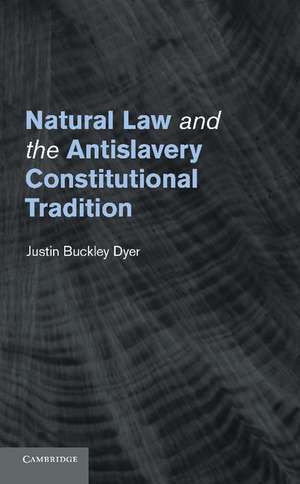Natural Law and the Antislavery Constitutional Tradition
Autor Justin Buckley Dyeren Limba Engleză Paperback – 17 dec 2014
| Toate formatele și edițiile | Preț | Express |
|---|---|---|
| Paperback (1) | 279.98 lei 6-8 săpt. | |
| Cambridge University Press – 17 dec 2014 | 279.98 lei 6-8 săpt. | |
| Hardback (1) | 548.63 lei 6-8 săpt. | |
| Cambridge University Press – 12 feb 2012 | 548.63 lei 6-8 săpt. |
Preț: 279.98 lei
Nou
Puncte Express: 420
Preț estimativ în valută:
53.58€ • 57.29$ • 44.67£
53.58€ • 57.29$ • 44.67£
Carte tipărită la comandă
Livrare economică 17 aprilie-01 mai
Preluare comenzi: 021 569.72.76
Specificații
ISBN-13: 9781107454354
ISBN-10: 1107454352
Pagini: 208
Dimensiuni: 140 x 218 x 13 mm
Greutate: 0.27 kg
Editura: Cambridge University Press
Colecția Cambridge University Press
Locul publicării:New York, United States
ISBN-10: 1107454352
Pagini: 208
Dimensiuni: 140 x 218 x 13 mm
Greutate: 0.27 kg
Editura: Cambridge University Press
Colecția Cambridge University Press
Locul publicării:New York, United States
Cuprins
1. Prologue: slavery and the laws and rights of nature; 2. Introduction: the apple of gold; 3. Somerset and the antislavery constitutional tradition; 4. Constitutional disharmony in The Antelope and La Amistad; 5. Constitutional construction in Prigg and Dred Scott; 6. Natural law, providence, and Lincoln's constitutional statesmanship; 7. Public reason and the wrong of slavery; 8. Conclusion: the heritage of the antislavery constitutional tradition.
Recenzii
'In this provocative book, Justin Buckley Dyer makes a case for the US Constitution's natural law foundations. He does not divine the Constitution's meaning from the intent of the Founders or the understanding of the ratifiers, however. Rather, he argues that natural law informed constitutional thinking and that abolitionists who deployed natural law concepts in their subsequent reading of the Constitution were substantially right.' H. Robert Baker, The Journal of American History
'Justin Buckley Dyer's heart seems to lie in theory, though his strongest contributions are historical … Dyer's first book is a worthwhile rejoinder to the prevailing trend of histories depicting the Constitution as neutral-at-best on slavery.' Aaron Keck, Political Theory
'Justin Buckley Dyer does a wonderful job highlighting how the Declaration of Independence in particular and natural law principles more generally inspired the antislavery movement in the United States. Natural Law and the Antislavery Constitutional Tradition boldly defends the Lincolnian proposition that 'the Constitution drew aspirational content from the [natural law] principles in the opening lines of the Declaration of Independence, 'and is the best extant account for how prominent antislavery activists employed those principles in their effort to place slavery on 'the course of ultimate extinction'. … The chapters on John Quincy Adams and Justice John McLean are particularly worth the price of admission.' Mark A. Graber, Tulsa Law Review
'If the purpose of Dyer's book is to serve as a resource on the foundations and meanings of American antislavery constitutional rhetoric, then this is a fine contribution to the literature. It makes compelling links between past thought and more recent legal philosophers. In particular, it sheds clear light on the natural-law thinking of celebrated judges and statesmen, like Mansfield, Adams, and Lincoln.' Dominic DeBrincat, H-Net Reviews
'Justin Buckley Dyer's heart seems to lie in theory, though his strongest contributions are historical … Dyer's first book is a worthwhile rejoinder to the prevailing trend of histories depicting the Constitution as neutral-at-best on slavery.' Aaron Keck, Political Theory
'Justin Buckley Dyer does a wonderful job highlighting how the Declaration of Independence in particular and natural law principles more generally inspired the antislavery movement in the United States. Natural Law and the Antislavery Constitutional Tradition boldly defends the Lincolnian proposition that 'the Constitution drew aspirational content from the [natural law] principles in the opening lines of the Declaration of Independence, 'and is the best extant account for how prominent antislavery activists employed those principles in their effort to place slavery on 'the course of ultimate extinction'. … The chapters on John Quincy Adams and Justice John McLean are particularly worth the price of admission.' Mark A. Graber, Tulsa Law Review
'If the purpose of Dyer's book is to serve as a resource on the foundations and meanings of American antislavery constitutional rhetoric, then this is a fine contribution to the literature. It makes compelling links between past thought and more recent legal philosophers. In particular, it sheds clear light on the natural-law thinking of celebrated judges and statesmen, like Mansfield, Adams, and Lincoln.' Dominic DeBrincat, H-Net Reviews
Notă biografică
Descriere
A succinct account of the development of American antislavery constitutionalism in the years preceding the Civil War.








